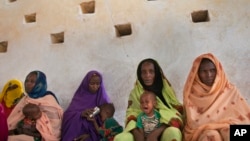The World Health Organization is calling for the urgent scale-up of mass vaccinations against preventable killer diseases in West Africa’s Ebola-affected countries, now that the deadly disease is on the decline.
Many illnesses, including child-killing, vaccine-preventable diseases, have been neglected In West Africa’s Ebola-affected countries. Liberia, Sierra Leone, and Guinea have diverted most of their resources and efforts toward containing the deadly Ebola virus over the past year.
Today's WHO announcement came just as officials in Liberia reported the country's first new case of Ebola in weeks, ending hopes that the nation had beaten the deadly virus. Officials say the new patient has been transferred to an Ebola treatment center in the capital, Monrovia.
Citing massive help from the International community, however, WHO say the disease is on the wane and attention must now return to tackling diseases that are threatening the lives and well-being of children.
The U.N. health agency warns of a growing risk of outbreaks of measles, pertussis, and other vaccine-preventable diseases in countries affected by Ebola. It says routine immunizations must be urgently scaled up to counter this potentially dangerous situation.
Concerns about possible measles outbreaks are particularly high. WHO reports that since January, Liberia has had 44 suspected cases of measles, Guinea has had 305 cases, including two deaths, and Sierra Leone has had 142 cases with one death.
WHO Director of Service Delivery and Safety Edward Kelley says plans are underway in all three countries for nationwide measles vaccination campaigns for children under age five. He tells VOA mass campaigns will occur only in areas that are free of Ebola.
“Wherever there is life-saving interventions that can be brought to bear, in this case measles vaccination, WHO and its partners would be pushing it," he said. "In this case though because of the concern of mass gatherings, it would be done through routine services in districts that might still have Ebola transmission. And, in that case, standard precautions which are the gold standard for infection prevention would be recommended for that.”
Dr. Kelley says WHO has guidelines regarding personal protective equipment and other safety measures that should be applied in sensitive immunization situations.
WHO says the first nationwide measles campaigns are expected to occur in Sierra Leone in April. This will be followed in Liberia in May and Guinea sometime later in the year.
During the Ebola outbreak, people infected with malaria have been unable to get treatment, largely because health centers were closed. Dr. Kelley says the WHO is working to address this problem before the rainy season begins and malaria explodes in the region.
“There has already been a lot of work done by the Global Malaria program at WHO on trying to get insecticide bed nets out there," he said. "For instance, there was a mass drug administration campaign also to basically mass treat for malaria in Sierra Leone. We treated over two million people preemptively or malaria…and we had over 300,000 bed nets that were distributed at that point too.”
Dr. Kelley says similar plans are in the works for Guinea. He notes Liberia, which is well on the way toward becoming Ebola-free, has rolled out its full malaria program.




